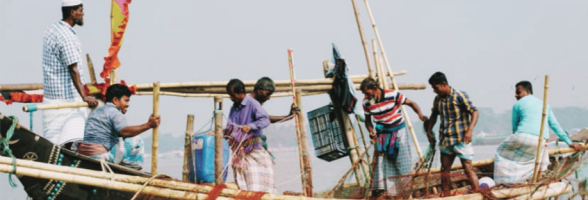“TROSA is a water governance programme funded by the Government of Sweden. It aims to ensure that riverine communities uphold their rights, build their resilience, and participate in water resource management”
The Ganga-Brahmaputra-Meghna (GBM) river system is the lifeline of South Asia, sustaining the livelihoods of over 800 million people across Nepal, Bhutan, India, and Bangladesh. These rivers are not just sources of water—they shape cultures, support economies, and define the identities of communities living along their banks. For centuries, riverine communities have relied on these waters for agriculture, fisheries, trade, and transport, weaving their traditions and spiritual beliefs into the natural rhythm of the rivers.
However, these lifelines are under severe threat. Climate change, unsustainable development, and weak governance have disrupted the delicate balance between people and rivers. Erratic monsoon patterns, prolonged droughts, and intensified floods have made water access unpredictable, while unchecked riverbank erosion displaces thousands of families every year. Women, Indigenous Peoples, and small-scale fishers—who have historically played key roles in managing and protecting these water systems—are often the most vulnerable, yet their voices are seldom included in decision-making.
As the impacts of climate change intensify, protecting these rivers requires regional cooperation, inclusive governance, and the leadership of local communities. By strengthening collective action and knowledge-sharing, we can ensure that the GBM rivers continue to support life for generations to come.
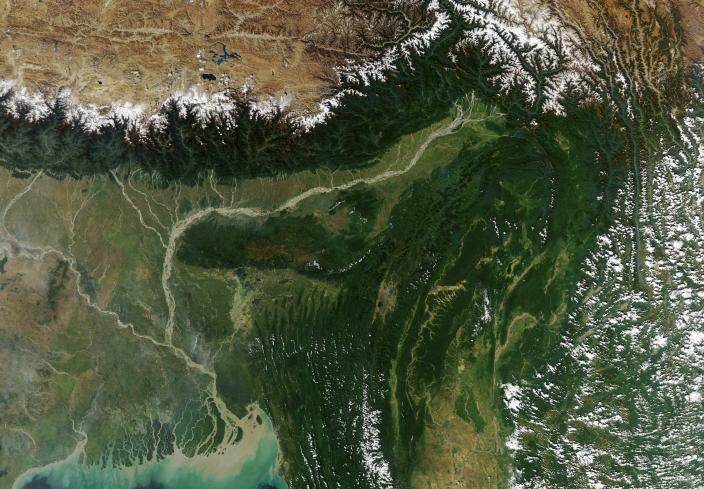
A natural colour image of the Brahmaputra river. NASA Earth Observatory image by Lauren Dauphin, using MODIS data from NASA EOSDIS/LANCE and GIBS/Worldview. November 2020. Hover mouse pointer to read description.
TROSA T2:3R: Building on Success
The Transboundary Rivers of South Asia (TROSA) program, launched in 2017, has focused on transforming water governance across the GBM basin. Over five years, it facilitated cross-border dialogues, strengthened community leadership, and promoted sustainable water management at multiple levels across Nepal, India, Bangladesh and Myanmar. In it's second phase TROSA focuses its activities in Nepal, India, Bhutan and Bangladesh.
In Phase I, TROSA helped communities secure fairer access to water resources by organizing local river dialogues (nadi baithaks/nodi boithoks), where fishers, farmers, and women’s groups could meaningfully engage with decision-makers. It also played a critical role in establishing early warning systems, reducing the loss of life and property during seasonal floods. In Bangladesh and India, TROSA supported the adoption of nature-based solutions (NbS) such as bandalling, a traditional bamboo structure that reduces erosion and improves fish breeding. In Nepal TROSA secured a joint commitment called The Dhangadi Declaration- an instrumental six point commitment among the local government, CSOs, private sector and riverine communities to collaboratively address the issues facing the Mahakali river. The establishment of Women Empowerment Centers (WECs) has encapcitated and empowered local community women to take leadership roles and contribute meaningfully in policy making processes.
Building on these successes, the second phase of TROSA, also called T2:3R, Rivers, Rights, and Resilience (2023-2027) deepens its commitment to strengthening climate resilience and ensuring inclusive governance. This new phase of activities will scale up previous initiatives while addressing emerging challenges such as climate-driven displacement, transboundary cooperation, and access to climate finance for vulnerable communities. By expanding partnerships and amplifying local voices, TROSA T2:3R aims to create lasting, systemic change in river governance across South Asia.
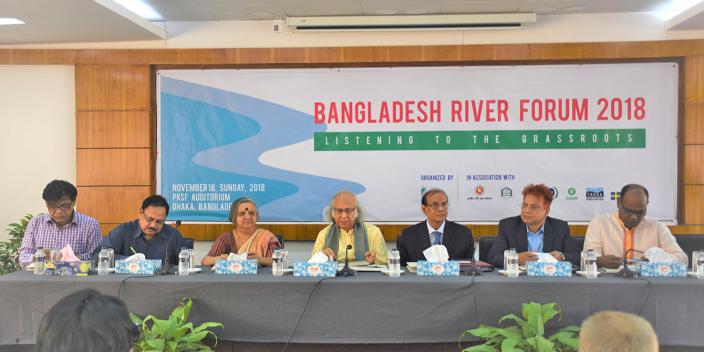
How TROSA T2:3R works
TROSA T2:3R focuses on four key areas: climate-resilient livelihoods, ecosystem protection, community empowerment, and regional cooperation.
To strengthen climate resilience, the program supports sustainable aquaculture, alternative livelihoods, and climate-smart agriculture. In Nepal’s Mahakali basin, small-scale farmers will adopt drought-resistant crops and water-efficient irrigation to safeguard food security.
For ecosystem protection, it promotes community-led conservation and river health monitoring. In Bangladesh’s Kurigram district, fishers will track species migration and collaborate with policymakers on sustainable fishing policies.
Community leadership is central, with women, Indigenous groups, and youth trained in water governance and advocacy. In Assam, women’s networks have already secured government funding for flood protection projects and will continue lobbying for improved water access.
To enhance regional cooperation, the program facilitates cross-border agreements on water-sharing and flood management, particularly between India, Nepal, and Bangladesh. Partnering with research institutions and civil society, it will establish real-time water data sharing to improve disaster preparedness and reduce conflicts.
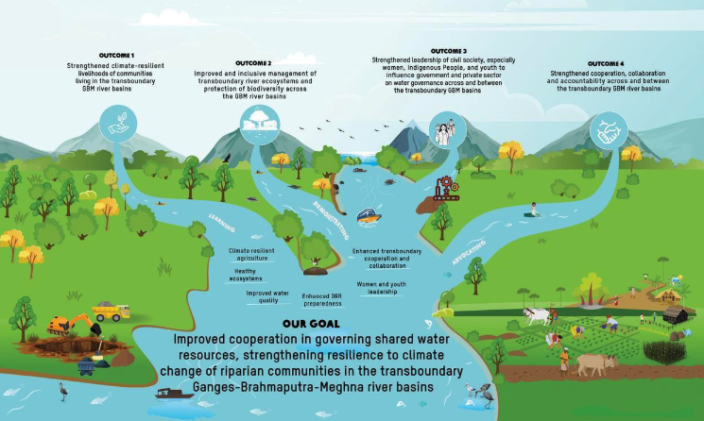
TROSA T2:3R Theory of Change.
A partnership-based regional initiative
TROSA 2 is built on a strong network of regional and national partners, bringing together organizations with expertise in research, policy advocacy, and community engagement. These partnerships ensure that TROSA’s work is informed by scientific research, traditional knowledge, and local realities.
At the regional level, TROSA collaborates with leading international institutions such as IUCN, ADPC, CUTS, ICIMOD, IWMI, and SEI which provide technical expertise on climate adaptation and transboundary water management. These organizations play a key role in developing policy recommendations and research-driven solutions that influence national and regional water governance frameworks.
At the national level, TROSA partners with leading organizations in Bangladesh, India, and Nepal that work directly with riverine communities. In Bangladesh, RDRS Bangladesh and CNRS focus on flood resilience and climate adaptation. In India CUTS, and Grameen Development Services work on advocacy and capacity building for marginalized communities. In Nepal, NEEDS Nepal, CRDS, and RUWDUC empower local communities in river governance and sustainable resource management.
These partnerships create a powerful network for collective action, ensuring that TROSA 2’s impact is long-term and sustainable.

TROSA T2:3R regional partner organizations.
Engaging Youth & Women in Collective Action
Young people and women play a crucial role in shaping the future of water governance in South Asia. TROSA places a strong emphasis on empowering youth and women as leaders in transboundary cooperation and climate action.
One of its flagship initiatives is the Youth Basin Ambassadors (YBA) program, which trains young leaders from Nepal, India, and Bangladesh in water governance, climate resilience, and advocacy skills. These youth ambassadors will work within their communities to promote sustainable water practices, organize awareness campaigns, and facilitate dialogues between stakeholders. In Assam, for example, youth-led initiatives have already helped introduce climate-smart farming techniques to local farmers, improving crop yields while conserving water.
Women’s leadership is equally central to TROSA 2’s approach. Women’s networks established during the first phase will be further strengthened, allowing more women to engage in decision-making spaces, advocate for their water rights, and influence local policies. In Nepal’s western river basins, women’s cooperatives are being trained to monitor groundwater levels and negotiate with local authorities for fairer water allocation.
By fostering collaboration across generations and sectors, TROSA is working to ensure that water governance is not only inclusive but also resilient, adaptable, and deeply rooted in local realities.
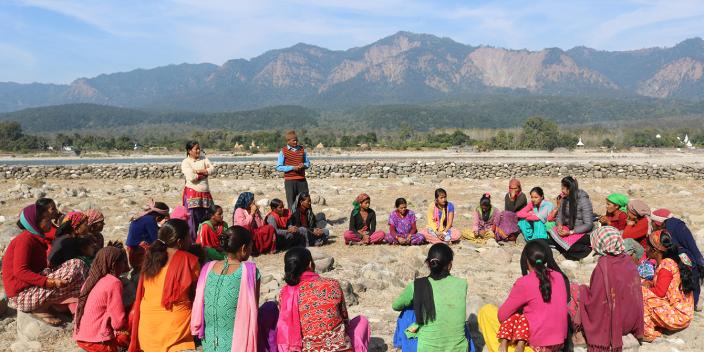
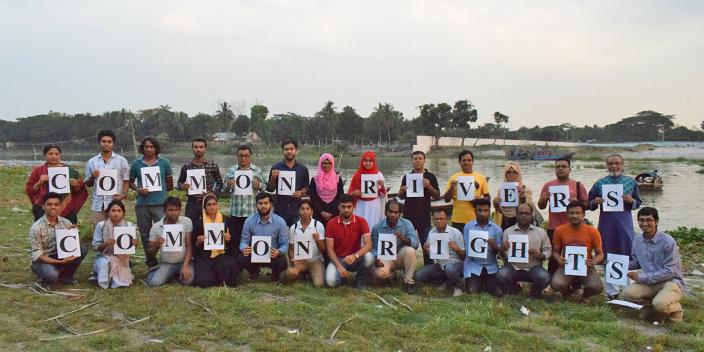
Positive Ripples

Let's Get in Touch
TROSA T2:3R believes in partnership and collective action. We value your interest and welcome your support to foster stronger partnerships for a just world without poverty.
Please get in touch with our Program Management Unit (PMU) hosted at Oxfam in Cambodia, Phnom Penh to learn more about our work.
Email: Info.Trosa@oxfam.org
Follow us on social media at X @RiversTROSA and LinkedIn at Transboundary Rivers of South Asia (TROSA) - Oxfam


